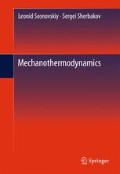Abstract
The theory of evolution is stated on the basis of the entropy concept. In addition to the traditional understanding of (thermodynamic) entropy as a characteristic of energy dissipation, the concept of Tribo-Fatigue entropy as a characteristic of energy absorption is introduced. The analysis of time changes in total (joint) entropy leads to the law of increase in entropy of any systems.
Access this chapter
Tax calculation will be finalised at checkout
Purchases are for personal use only
References
Amiri, M., Khonsari, M.M.: On the thermodynamics of friction and wear—a review. Entropy 12, 1021–1049 (2010)
Bryant, M.D.: Entropy and dissipative processes of friction and wear. Trans. Fac. Mech. Eng., Belgrade, 55–60 (2009)
Doelling, K.L., et al.: An experimental study of the correlation between wear and entropy flow in machinery components. J. Appl. Phys. 88, 2999–3003 (2000)
Feynman, R.: Feynman’s Lectures on Physics. Mir, Moscow (1963). (in Russian)
Kondepudi, D., Prigogine, I.: Modern Thermodynamics: From Heat Engines to Dissipative Structures. John Wiley & Sons, Chichester (1998)
Mase, G.: Theory and Problems of Continuum Mechanics. McGraw-Hill, New York (1970)
Naderi, M., Khonsari, M.M.: An experimental approach to low-cycle fatigue damage based on thermodynamic entropy. Int. J. Solids Struct. 4, 875–880 (2010)
Naderi, M., Khonsari, M.M., Amiri, M.: On the thermodynamic entropy of fatigue fracture. Proc. Royal Soc. Ser. A 466, 423–438 (2010)
Naderi, M., Khonsari, M.M.: A thermodynamic approach to fatigue damage accumulation under variable loading. J.Mater. Sci. Eng. Ser. A 527, 6133–6139 (2010)
Nicolis, G., Prigogine, I.: Exploring Complexity (An Introduction). Freeman & Company, New York (2003)
Prokhorov A.M. (ed.): Physical Encyclopaedic Dictionary. Soviet Encyclopaedia, Moscow (1983) (in Russian)
Sedov, L.I.: Mechanics of a Continuous Medium. Nauka, Moscow (1973). (in Russian)
Sherbakov, S.S., Sosnovskiy, L.A.: Mechanics of Tribo-Fatigue Systems. BSU Press, Minsk (2010). (in Russian)
Sosnovskiy, L.A., et al.: Reliability. Risk. Quality. BelSUT Press, Gomel (2012). (in Russian)
Sosnovskiy, L.A., Sherbakov, S.S.: Mechanothermodynamic system and its behavior. Continuum Mech. Thermodyn. 24(3), 239–256 (2012)
Sosnovskiy, L.A.: Fundamentals of Tribo-Fatigue. BelSUT Press, Gomel (2003). (in Russian)
Sosnovskiy, L.A.: Mechanics of the irreversible damages caused by contact and noncontact load. In: Proceedings of World Tribology Congress III, Washington, 12–16 Sept 2005, pp. 2–8 (2005)
Sosnovskiy, L.A.: Tribo-Fatigue. Wear-Fatigue Damage and Its Prediction (Foundations of Engineering Mechanics). Springer, Berlin (2005)
索斯洛夫斯基著, L.A.: 摩擦疲劳学 磨损—疲劳损伤及其预测. 高万振译—中国矿业大学出版社 (2013) (in Chinese)
Sosnovskiy, L.A.: L-Risk (Mechanothermodynamics of Irreversible Damages). BelSUT Press, Gomel (2004). (in Russian)
Sosnovskiy, L.A., Makhutov, N.A.: Reiability of Tribo-Fatigue systems in the non-classical statement. In: Conference on Sirvivability and Construction Material Science, 22–24 Oct 2012, Moscow, p. 53. Press of the A.A. Blagonravov Institute of Mechanical Engineering, Moscow (2012)
Sosnovskiy, L.A., Sherbakov, S.S.: Surpises of Tribo-Fatigue. BelSUT Press, Gomel (2005). (in Russian)
Sosnovskiy, L.A.: Intelligent dynamic systems: problem and research perspectives. mechanics 2011. In: Proceedings of V Belarusian Congress on Theoretical and Applied Mechanics, vol. 1, pp. 64–79. Press of the Joint Institute of Mechanical Engineering of NAS of Belarus, Minsk (2011) (in Russian)
Sosnovskiy, L.A.: Mechanics of Wear-Fatigue Damage. BelSUT Press, Gomel (2007). (in Russian)
Sosnovskiy, L.A.: On dynamic systems with elements of intelligence. In: Zhuravkov M.A., et al. (eds.) Proceedings of VI International Symposium on Tribo-Fatigue, 25 Oct–1 Nov 2010, Part 2, pp. 573–582. BSU Press, Minsk (2010) (in Russian)
Sosnovskiy, L.A.: Statistical Mechanics of Fatigue Damage. Nauka i Tekhnika, Minsk (1987). (in Russian)
Author information
Authors and Affiliations
Corresponding author
Rights and permissions
Copyright information
© 2016 Springer International Publishing Switzerland
About this chapter
Cite this chapter
Sosnovskiy, L., Sherbakov, S. (2016). Entropy States of Mechanothermodynamic Systems and Their Evolution. In: Mechanothermodynamics. Springer, Cham. https://doi.org/10.1007/978-3-319-24981-0_3
Download citation
DOI: https://doi.org/10.1007/978-3-319-24981-0_3
Published:
Publisher Name: Springer, Cham
Print ISBN: 978-3-319-24979-7
Online ISBN: 978-3-319-24981-0
eBook Packages: EngineeringEngineering (R0)

